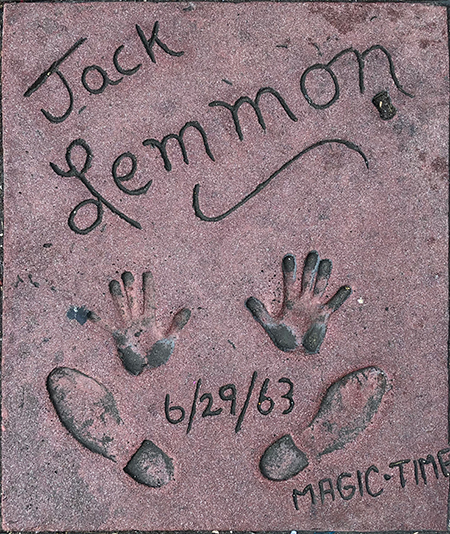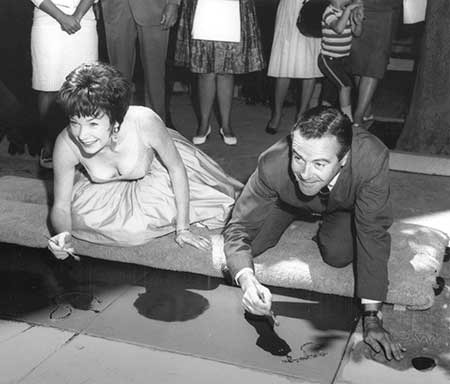 |
 |
|
|
| Jack Lemmon with Shirley MacLaine |
 |
| Forecourt Ceremony held on Saturday, June 29, 1963 |
| |
Born: John Uhler Lemmon III, February 8, 1925, in Newton, Massachusetts
Age at the time of the ceremony: 38
Died:
June 27, 2001, in Los Angeles, California, age 76.
|
| |
Jack Lemmon was one of the most charming and affable figures in cinema. A gifted comic with a rare natural quality onscreen, producers sought him out during his long career — sometimes with mixed results — but his classics are a joy to behold.
Born in an elevator at a hospital in Newton Massachusetts, Jack was an only child. He knew acting was what he wanted to do at the age of eight. While attending Harvard College, Lemmon was active in dramatics circles, becoming president of the Hasty Pudding Club.
During World War II, Lemmon served as an ensign on an aircraft carrier in the US Navy, but did not see action. Returning to Harvard, he graduated with a degree in War Service Sciences. Moving to New York, Lemmon studied with Uta Hagen. Lemmon got some work in television in New York, appearing most frequently on Kraft Theatre in 1949, 1951 (twice), and 1953 (also twice).
He made his Broadway debut in a revival of Room Service in April 1953, but it flopped. Signed to an acting contract at Columbia Pictures, Lemmon made his film debut in the charming It Should Happen to You (released in March 1954) with Judy Holliday. They were both re-teamed in Phffft (released in November 1954). Famously, Lemmon was cast as Ensign Pulver in the film of Mister Roberts (released in July 1955) with Henry Fonda. Lemmon bagged a supporting actor Oscar for this great film.
Lemmon starred with Janet Leigh in a musical version of My Sister Eileen (released in September 1955), and appeared in the bodice-ripper Fire Down Below (released in May 1957), but Robert Mitchum got all the action from Rita Hayworth. A better fit was Operation Mad Ball (released in August 1957) with Ernie Kovacs. Lemmon also appeared in Bell Book and Candle (released in November 1958) with James Stewart.
It was director Billy Wilder who finally came up with a role Lemmon could attack with gusto: Jerry / Daphne in the outrageously funny Some Like It Hot (which played the Chinese in April 1959). Wilder promised to work with Lemmon again.
And how. Teamed with Shirely MacLaine, the result was one of Lemmon's (and Wilder's) best films: The Apartment (which would play the Chinese in June 1960). Wilder promised to work with Lemmon and MacLaine again.
Before that however, Lemmon made The Wackiest Ship in the Army (released in December 1960), and The Notorious Landlady (released in April 1962), and oh — starred in the film of The Days of Wine and Roses (released in December 1962) for director Blake Edwards. Then, Lemmon could re-team with Shirley MacLain in Billy Wilder's film, Irma La Douce (which played the Chinese in July 1963).
Thereafter followed a huge number of comic films for Lemmon to star in: Under the Yum Yum Tree (which played the Chinese in October 1963), Good Neighbor Sam (released in July 1964), How to Murder Your Wife (played the Chinese in April 1965), The Great Race (released in July 1965), The Fortune Cookie (played the Chinese in November 1966), The Odd Couple (released in May, 1968), The Out of Towners (released in May, 1970), and Avanti! (released in December, 1972).
Lemmon abruptly switched gears, starring as a clothing company executive in the low-budget drama, Save the Tiger (released in February 1973) and for which Lemmon would get another Oscar — for best actor this time. Returning to Billy Wilder / Neil Simon Land, Lemmon starred in The Front Page (released in December 1974), and The Prisoner of Second Avenue (released in March 1975).
Really switiching gears, Lemmon appeared in Airport '77 (released in March 1977), then returned to Broadway in a play written especially for him, called Tribute, which ran for 212 perfs in the 1978 season. He toured extensively with the show, then starred in a film version, released in December 1980.
After making a strong impression in The China Syndrome (released in March 1979), Lemmon starred in Billy Wilder's last film, Buddy, Buddy (released in December 1981), which was a dud, but he bounced back as a distraught father looking for his kidnapped daughter in Missing (released in March 1982).
Lemmon was now inclined to work in both dramas, like Mass Appeal (released in December 1984), and comedies, like That's Life! (released in October 1986). Lemmon undertook the role of James Tyrone opposite protogée Kevin Spacey in a Broadway revival of Long Day's Journey Into Night for only 60 perfs in 1986. The production was transferred to television, airing over Showtime in April 1987).
Lemmon had a starring role in Glengary Glen Ross (released in October 1992), then enjoyed a large comedy hit with Grumpy Old Men (released in December 1993) with reoccuriing co-star Walter Matthau. A sequel was equally successful, Grumpier Old Men (released in December 1995).
Late Lemmon films include Out to Sea (released in July 1997), a television version of 12 Angry Men aired over Showtime in August 1997, The Odd Couple II (released in April 1998), a television version of Inherit the Wind aired over Showtime in May 1999, opposite George C. Scott, and finally, the television movie of Tuesdays with Morrie, airing over ABC in December 1999.
Battling cancer of the bladder for the last two years of his life, Lemmon died of the disease in June 2001 at the age of 76. |
|
|
|
|
| |
 |
 |
| Grauman's Chinese Theatre, Hollywood, California. Jack Lemmon Forecourt block. Executed by John Tartaglia, Saturday, June 29, 1963. 32 x 38 inches. |
 |
 |
 |
| Grauman's Chinese Theatre, Hollywood, California. Jack Lemmon / Shirley MacLaine Forecourt ceremony, Saturday, June 29, 1963. Shirley MacLaine and Jack Lemmon begin signing their names in separate blocks to celebrate their newest film, Irma La Douce, which would play the Chinese the following week (for 16 weeks!). |
|
 |
| |
 |
| |
|